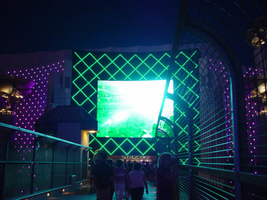Search the Special Collections and Archives Portal
Search Results
Chris Lee oral history interview
Identifier
Abstract
Oral history interview with Chris Lee conducted by Cecelia Winchell and Stefani Evans on December 14, 2021 for Reflections: The Las Vegas Asian American and Pacific Islander Oral History Project.
Judge Chris Lee reflects on the lives of his parents, their occupations and experiences during the Korean War, and his family's decision to immigrate from Incheon, South Korea to Las Vegas. He recalls memories from his childhood visiting family in Korea, Korean traditions and food, his educational pursuits, and the livelihood of his parents after immigrating. Chris also shares details of his employment history as Deputy District Attorney for the Clark County District Attorney’s Office, as Deputy Secretary of State for Southern Nevada, as the first Asian American elected to the Clark County Justice Court bench, and presently as Judge in Department 1 of the North Las Vegas Municipal Court.
Archival Collection
Phillip L. Cook oral history interview
Identifier
Abstract
Oral history interview with Phillip L. Cook conducted by Richard Strahan on March 3, 1977 for the Ralph Roske Oral History Project on Early Las Vegas. Cook first talks about his parents' move to Nevada and discusses how the school system has changed over time. He then describes the first businesses that opened up in the Downtown and Strip areas of Las Vegas, Nevada before discussing prostitution, Block 16, and recreational activities available to youth. Cook also talks about the first television sets and telephone systems made available, and he moves on to talk about the prices of things such as movies and haircuts when he was younger. The interview then moves to discussions on the Old Ranch, racial discrimination, school integration, the crime rate, and the school system in Las Vegas.
Archival Collection
Fred Houghton Papers
Identifier
Abstract
The Fred Houghton Papers (1909-1998) consist of Houghton’s legal and personal files on his Blue Chip Ranch property in Las Vegas, Nevada. The materials include legal cases, maps, reports, and correspondence concerning water access on the property, and his work with the Las Vegas Well Users Association, which primarily contains correspondence in conjunction with Las Vegas's water politics. The collection also contains court cases during the 1930s when Houghton worked as a lawyer in Chicago, Illinois, as well as legal files for his time as a public defender for the State of California. The personal files in the collection primarily consist of correspondence, banking records, diaries, and notebooks.
Archival Collection
Klai Juba Wald Architectural Records
Identifier
Abstract
The Klai Juba Wald Architectural Records (2000-2020) are comprised primarily of digital architectural renderings for projects completed by Las Vegas, Nevada architecture and interior design firm Klai Juba Wald Architecture + Interiors. The collection is comprised of renderings for the firm's projects conducted mainly around Las Vegas, but also includes projects around the United States such as the Seminole Hard Rock Hotel and Casino in Florida and Rivers Casino in Illinois. Also included are master plans and presentation slides for projects like the Choctaw Casino in Oklahoma and Live! Casino & Hotel in Maryland. Master plans for projects in Las Vegas include the LINQ, Silverton Casino Hotel, and Hard Rock Las Vegas.
Archival Collection
Edwin "Tony" Wuehle oral history interview
Identifier
Abstract
Oral history interview with Edwin "Tony" Wuehle conducted by David Schwartz on December 21, 2006 for the Boyer Early Las Vegas Oral History Project. In this interview, Wuehle discusses his early life in Hettinger, North Dakota and his career as an educator. He recalls his first experiences playing poker, participating in home poker games while living in Michigan’s Upper Peninsula, and using a pseudonym as a player. Wuehle then talks about writing a book, founding the Gamblers Book Club Press in Las Vegas, Nevada, and writing for religious publications. Later, Wuehle explains the tension between participating in religion and playing poker. He describes Las Vegas poker rooms during the 1960s and 1970s and shares his thoughts on online poker. Lastly, Wuehle discusses why casinos use prop players and his efforts to organize a poker tournament to raise funds for Bay de Noc Community College in Michigan.
Archival Collection
Las Vegas Jazz Society Records
Identifier
Abstract
The Las Vegas Jazz Society Records (approximately 1975-2003) are comprised of organizational records including meeting agendas, minutes, and membership statistics of the Las Vegas Jazz Society (LVJS). Included in the collection are issues of the LVJS's newsletter Jazz Notes, promotional materials, blank membership applications, correspondence, information on other regional jazz societies, and photographic prints depicting various events and festivals. A portion of this collection documents LVJS's involvement in saving the KUNV 91.5 FM radio station.
Archival Collection
Hal Rothman Faculty Papers
Identifier
Abstract
The Hal Rothman Faculty Papers (approximately 1930-2006) are comprised primarily of research, teaching, and professional papers of Hal Rothman, professor of history at the University of Nevada, Las Vegas (UNLV). The papers include Rothman's research notes, manuscript drafts, conference articles, lecture notes, audiovisual material for his book
Archival Collection

Photographs of MGM Grand signs, Las Vegas (Nev.), 2002
Date
Archival Collection
Description
Site name: MGM Grand Hotel and Casino
Site address: 3799 S Las Vegas Blvd
Sign owner: MGM Mirage
Sign details: The MGM Grand is host to several types and numbers of signs around the exterior of the property. These types include the MGM lion logo and text which adorn the tops of the towers, a multimedia pylon sign, a golden monument sculpture of a lion which serves as the main entrance, and several smaller textual signs that denote parking and entrances.
Sign condition: Structure 5 Surface 5 Lighting 5 Notes: The MGM's signage is excellent repair, being a less than a decade old. The structure is intact, as well as all the lighting, and surface.
Sign form: Pylon; Fascia; Porte-cochère
Sign-specific description: The property contains different types signs including Pylon, sculpted three-dimensional signs as well as building front logos. The pylon sits along the East side of Las Vegas Blvd, just north of Tropicana Blvd, and faces north /south. Constructed as if to appear as different sized towers from the emerald city, the double backed pylon contains the MGM Lion Logo in a backlit steel cabinet and the Letters "MGM" at the top in gold polished channel letters with horizontal bars of Neon. Directly beneath that sit two message centers one being an animated color LED screen on the left, and the one on the right being a backlit plastic advertisement screen. Located beneath the two screens the phrase The City of Entertainment in all capital polished gold aluminum channel letters with neon running horizontally across the diameter of the letters. The sculpted three dimensional lion structure sits on the North East corner of Las Vegas Blvd and Tropicana and faces to the Southwest. The statue appears to be made of polished gold and is surrounded by an impressive array of fountains, which are illuminated themselves. The statue is ambiently lit from underneath with spot lighting and the glow of the fountains. Serving as a backdrop for the structure, an impressive wall of multicolored incandescent bulbs form a concave geometric canvass that wraps the corner of the building. This wall is separated into different sized fields by square columns of similar height. Sitting atop each of the columns is a statue of a man holding a giant urn upon his back. The statuary is lit from underneath with ambient lighting similar to that of the lion sculpture. The bulbs animate in a subtle waving pattern that gently creates the illusion of a rippling of the surface.
Sign - type of display: Neon; Incandescent; Matrix; Backlit
Sign - media: Steel; Plastic; Fiberglass; Masonry; Glass
Sign animation: Chasing, flashing, oscillating
Notes: The V-shaped red channels on the silver main pylon chase each other downward toward the ground. The main text on the pylon animates as well. The letters light up one at a time with red neon from left to right as the arrows continue to chase downward. The logo/text sign located above the giant replica of the Harley Davidson, animate as well. The incandescent bulbs which fill the text, spelling the name of the establishment, oscillate, steady burn, then shut off, and then restarting the sequence. The letters that spell cafe on the lower portion of the sign animate in concert and with the same sequence as the main text.
Sign environment: The MGM Grand dominates the corner on which it sits. Headed west on Tropicana toward the Strip the property casts a green glow but not too electrifying. Once you reach the corner you can't help but be overwhelmed by standing underneath the looming golden lion and the bustling fountains. Facing the structure from the corner, the facade becomes a canvass of dancing light and water. Look up toward the strip the giant pylon booms the golden letters "MGM" and busy LED screens.
Sign - date of installation: Property was opened in 1993 but signage was changed in 1998
Sign - date of redesign/move: The original sculpted lion entrance was replaced in 1998 with a new trophy style sculpture. With the original sphinx structure, patrons passed trough the mouth of the lion into the main lobby of the hotel. Guests and visitors now pass around the pedestal on which the lion sits upon.
Sign - thematic influences: The exterior of the MGM Grand Hotel incorporates the themes of the movie industry for which the name is so prominent. Most specifically the Wizard of Oz's Emerald city theme. The structure is designed to look as such with the base color of the building being emerald green as well as the pylon structures and attached buildings such as the parking garage. The font and MGM lion logo are represented with gold coloring referencing Oz's yellow brick road. The statue is reminiscent of an Academy award also referencing the industry which the name is so familiar with.
Sign - artistic significance: The establishment joins the era of themed modern Vegas resorts with its front spectacle, super pylon and aesthetic which is entirely encompassed by its theme.
Surveyor: Joshua Cannaday
Survey - date completed: 2002
Sign keywords: Oscillating; Pylon; Fascia; Porte-cochère; Neon; Incandescent; Matrix; Backlit; Steel; Plastic; Fiberglass; Masonry; Glass
Mixed Content

Brittany Castrejon oral history interview: transcript
Date
Archival Collection
Description
Oral history interview with Brittany Castrejon conducted by Claytee D. White and Barbara Tabach on November 9, 2017 for the Remembering 1 October Oral History Project. In this interview, Brittany Castrejon details her experiences during the evening of the 2017 mass shooting in Las Vegas, Nevada. She describes the Route 91 Harvest Festival set-up and details the events of that night, which she experienced alongside her 14-year-old cousin and a few friends. Castrejon tells her story of trying to find safety from the chaos during the entire ordeal, eventually finding refuge for the remainder of the night at the Tropicana hotel. She ends the interview by discussing her adjustment to life after the shooting and her post-traumatic stress disorder, as well as what she has learned from the experience.
Text
Wolff, Walter P., 1928-2016
http://www.ladailypost.com/content/obituary-walter-p-wolff-dec-29-2016
copied from resouce above
Person
